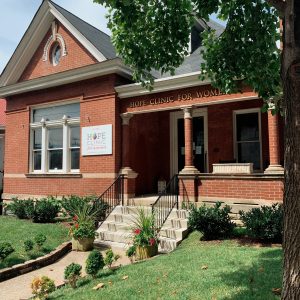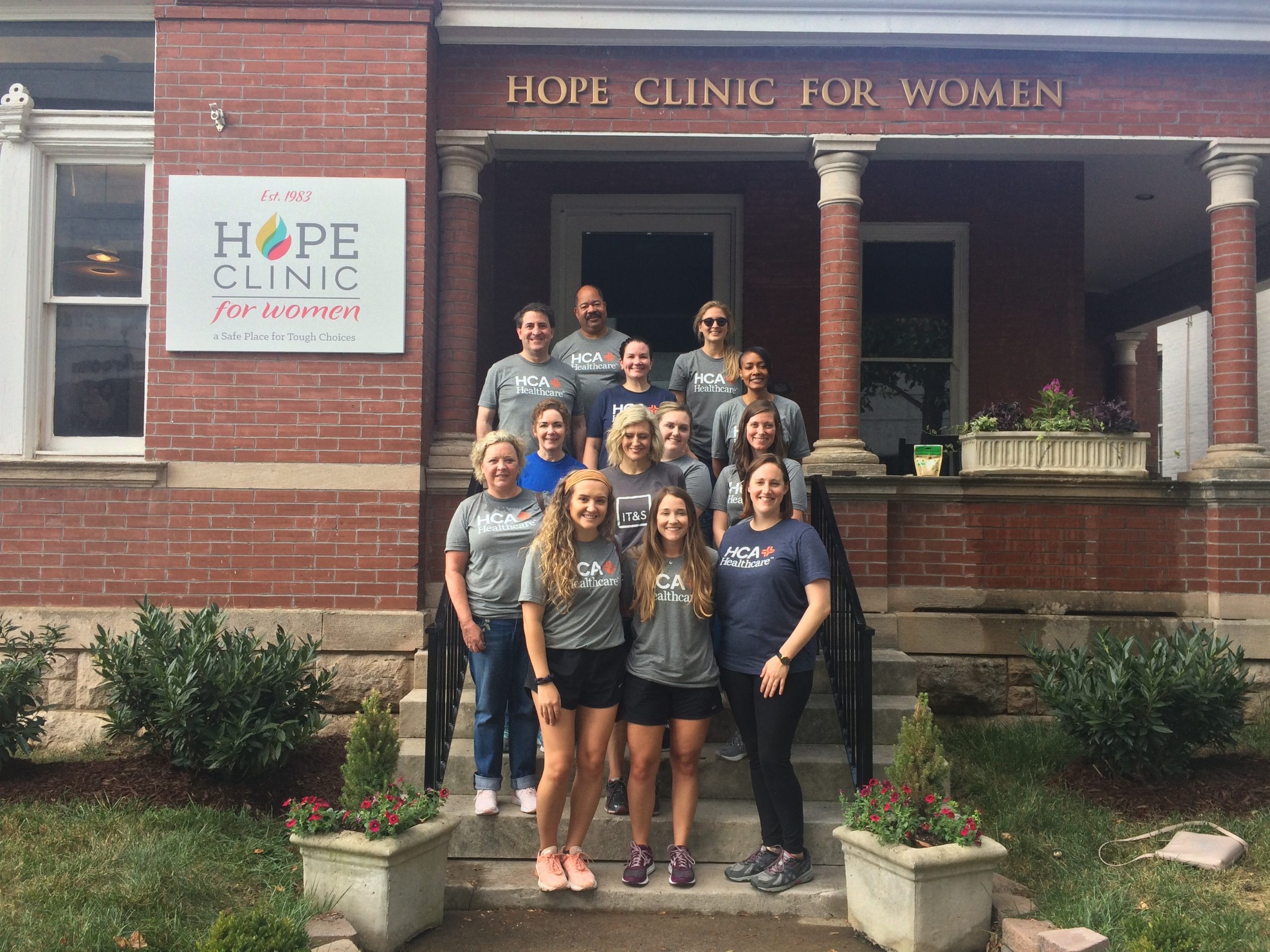Our History
Hope Clinic was founded by a group of OB/GYNs, community leaders and churches to meet the unique needs of women in unplanned pregnancies in a safe and confidential environment. Our goal was to reach primarily the abortion-minded and also the likely-to-carry young woman prior to going to an abortion clinic and sooner than she would possibly consider going to an adoption agency. Since 1983, when Hope Clinic began addressing the unmet needs of our community, we established a strong reputation among clients, donors, and volunteers. Because of our approach we reach a diverse group of women who cross political, religious and socioeconomic backgrounds.
In 1983, we opened our doors as The Crisis Pregnancy Center; with 450 square feet of space on Church Street in Nashville. We began by offering free: pregnancy tests, options counseling and referrals by trained lay volunteers. We also provided free maternity and baby items to those in our program.
In 1985, we saw the need for women who had already made a past decision to have an abortion and began our post-abortion counseling services. It was not uncommon for women to carry this burden for 10+ years.
In 1998, when STD rates in Tennessee were one of the worst in the country, the state approved federal (Title V) funding for abstinence education and we provided school programs to private and public schools in the most at-risk communities.
In 2001, we changed our name to: Hope Clinic for Women as we went medical. We hired a part time Nurse Practitioner to provide ultrasounds/prenatal education to our pregnant clients and std testing/treatment for anyone else at risk and without insurance. We found this medical care was another great opportunity to help educate women, encourage abstinence and equip them to make healthy choices. In 2009, this NP position became full time.
In 2007, we began undergraduate and graduate level practicum and work study options in partnership with Vanderbilt, Belmont, Trevecca, Lipscomb, and TSU universities. After many years and many clients we became aware of the various needs our clients face in an unplanned pregnancy: emotional, clinical, practical, medical and spiritual. To better treat the clinical and give even more focus to the spiritual we moved the majority of our counseling to our professional counselors (staff and master level practicum students from area universities).
In 2007 we also implemented our Bridge Program (for clients who choose to parent to participate in throughout pregnancy and up to the child’s first birth). This program included: mentorship, counseling, classes, and case management. Participation in this program earned clients points to redeem for free maternity/baby needs. We moved our lay counselors into the position of Bridge mentor and phone counselors. The mentor relationship is an ongoing 1 on 1 relationship with client and volunteer during their time in the Bridge Program. Over time, the spiritual mentor has an increased change for true spiritual guidance.
In 2007, after realizing the impact/influence of other people in the lives of our clients, we added a male therapist on staff to begin a program to counsel the fathers of the baby and the parents of the pregnant woman.
In 2007, we began offering all forms of pregnancy, prevention, and pregnancy loss counseling in a satellite location in Spring Hill, TN. This location was suspended after a few years.
In 2008, abstinence-based funding was suspended at the state level ending our school program. We continued the program in a small capacity in partnerships with local agencies. Thankfully, funding resumed in 2016 for us and the program has continued to grow even stronger than before.
In 2008, after seeing a prolonged issue of lack of housing for pregnant women (who were also not dealing with other addictions), we opened a maternity home for pregnant women to live before and after delivery. This was ended after 5 years as more residential programs emerged creating more effective referrals and partnerships than we were able to do.
In 2009, out of response from women and area hospitals, we expanded post abortion counseling to include other forms of Pregnancy Loss (miscarriage, stillbirth and infant death). This allows our brochure to be in many area hospitals where women who have had an abortion will hear about our Pregnancy Loss Counseling services for the first time.
In 2009, out of a growing need from our own clients and growing statistics reported nationwide, Baptist Hospital (now St. Thomas Midwest) reached out to us to receive the training and begin postpartum depression counseling.
In 2010, we began offering professional counseling services to our STD clients. We learned that while many of the women wanted to change their behaviors, there were underlying issues they needed to work through for success. This includes: individual and couples.
In 2010, we started bringing on volunteers and staff to help reach the Hispanic community with translation services.
In 2013, we hired part time RNs to work with our Nurse Practitioner.
In 2014 we began prescribing medication for anxiety and depression as needed for our counseling clients dealing with grief and trauma. We also increased ‘women and male issues’ counseling to cover sexual addiction and pornography.
In early 2015 we began offer counseling services in Williamson County on Saturdays. This was suspended after 3 years as we moved towards online/telehealth counseling.
In 2015, we also upgraded our medical visit of STI testing/treatment to include full OB/GYN and Annual Physical care. These services are still offered at a much lower rate than nearby women’s medical clinics.
In 2016 we have begun offering early well care visit to young teens as a beginning conversation about general health, unplanned pregnancies and STIs. This is a wonderful opportunity sometimes missed during a pediatric visit.
In 2018 an Endowment Fund was established for: future special program launches and unexpected capital concerns.
In 2018, Hope Clinic hired an HR consultant to review all internal procedures and begin the conversation of Diversity/Inclusion/Equity. Each year we continue to unpack this conversation through the lens of our mission statement and determine where we can improve in our relationships with clients, volunteers, staff, donors and the community.
In 2019 through a large designated donation we were able to make much needed changes onsite at the clinic to handle the increased client load and purchase hardware/software to make remote counseling/learning more practical.
In 2019, we began a partnership with People Loving Nashville to serve women experiencing homelessness who may be pregnant or are looking for access to women’s healthcare by making connections every Monday night at War Memorial Plaza.
In 2020, during the COVID-19 pandemic we were able to immediately switch care to all remote except for medical care and incorporate curbside pick up. Hope Clinic remained open and available to all clients.
In 2021 Hope Clinic made its final mortgage payment making Hope Clinic debt free!
Get involved
If you would like to support the work of Hope Clinic with your time or treasure, please visit our volunteer page or our donate page. We would not be able to do what we do and reach the individuals we do without the tireless work and support of people like you. Thank you!


